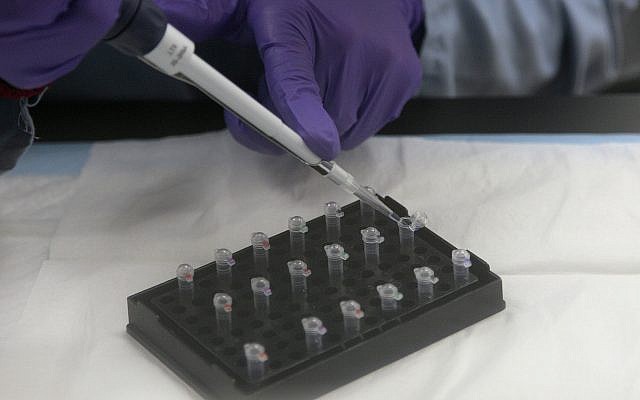2 drugs for Gaucher’s disease also fight COVID-19, Israeli defense lab finds
Defense Ministry-run Institute for Biological Research identifies medications treating the genetic disorder that can be used against viruses; one already has FDA approval

Illustrative
photo of mitochondrial DNA testing at the State of California
Department of Justice Jan Bashinski DNA Laboratory in Richmond,
California, February 17, 2012. (AP Photo/Jeff Chiu)
As one of these drugs — Cerdelga — has already been approved for use by the US Food and Drug Administration and the second — Venglustat — has almost completed the approval process, they may be fast-tracked for use with COVID-19 patients, the Defense Ministry said.
In the proposed antiviral treatment, the two drugs would be taken together.
“The two drugs under development are currently being tested for their effectiveness in treating animals infected with the coronavirus,” the ministry said.

The results of a trial testing two
Gaucher’s disease drugs on the coronavirus, published by the Institute
for Biological Research on May 26, 2020. (Defense Ministry)
The study on mice found that the medications inhibited the replication of the viruses in the bodies of the infected animals.
In addition to being effective against the coronavirus, the treatment was also found to work against three other viruses, Neuroinvasive Sindbis virus, West Nile virus and Influenza A virus, the researchers wrote.
“This indicates their potential in treating various viral diseases effectively — including future outbreaks of new viruses — once they are clinically approved,” the ministry wrote.
Gaucher’s disease is not caused
by a virus, but is a genetic disorder common among Ashkenazi Jews. The
researchers found that the drugs used to treat this disease cause the
creation of molecules called glycosphingolipids that appear to serve an
antiviral function, according to their article.
The
Institute for Biological Research has been deeply involved in the
development of coronavirus treatments and vaccine since the outbreak of
the disease.

President Reuven Rivlin (R) visits the Israel Institute for Biological Research in Ness Ziona on May 7, 2020. (Kobi Gideon/GPO)
During the trials, two groups of rodents were infected with the coronavirus, but only one group had first been given the vaccine. Whereas the unvaccinated group became sick, the vaccinated rodents remained healthy.
Testing on rodents is a key preliminary stage in developing medicines and enables further testing to begin on other animals. If those are also successful, the trials will move to humans to check the vaccine’s effectiveness and for any side effects.
Earlier this month, the laboratory said it had isolated eight antibodies it believed could be used to develop treatments for COVID-19, and that it was ahead of the world in those efforts.
The antibodies were produced from blood
taken from COVID-19 patients who developed serious symptoms, and then
recovered. The lab hopes to combine the antibodies into an effective
treatment for the virus. If researchers are able to make the medicine,
they will seek an international drug company to mass produce it.
That development would not be useful in the
creation of a vaccine, but would rather be a move toward a drug
treatment for those who have already contracted the disease.
About 100 research groups around the world
are pursuing vaccines for the coronavirus, with nearly a dozen in early
stages of human trials or poised to start. But so far there is no way to
predict which — if any — vaccine will work safely, or even to name a
front-runner.
Dr. Anthony Fauci, the US government’s top
expert, has cautioned that even if everything goes perfectly, developing
a vaccine in 12 to 18 months would set a record for speed.
The coronavirus has infected millions of
people around the world and killed hundreds of thousands, according to
the Worldmeter website that experts say under-counts the true toll of
the pandemic. Israel has had over 16,700 diagnosed cases of COVID-19,
with 281 deaths as of Monday.
----------------------------------------------------------------------------------------------------
RELATED:-
----------------------------------------------------------------------------------------------------
RELATED:-
Gaucher disease - Symptoms and causes - Mayo Clinic
www.mayoclinic.org › symptoms-causes › syc-20355546
No comments:
Post a Comment